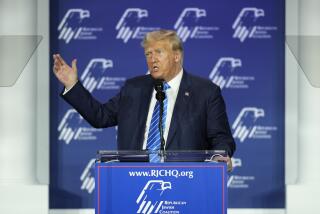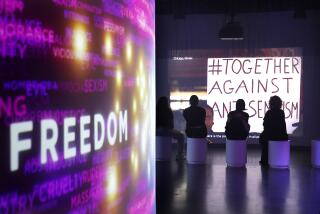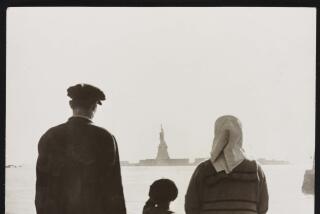Debating FDR and the Holocaust
- Share via
It wasn’t surprising that Rafael Medoff’s April 7 Op-Ed article about President Franklin D. Roosevelt’s private comments on Jews facing persecution in Europe drew spirited responses (though I do admit that I was a little rattled that most of the letters defended Roosevelt). We published several letters Friday -- one from an American Jew who favorably compared the 32nd president’s record on genocide to his successors. In response to that letter, in Saturday’s Postscript, Medoff listed several instances in which the Roosevelt administration neglected to do anything meaningful to interrupt the Holocaust -- and in ways that would not have undermined the war effort against Hitler.
Just as spirited as the reaction to Medoff’s original Op-Ed was the reader response to his follow-up. Nearly a dozen readers sent letters on the topic after Medoff responded to the initial batch. This time, however, readers were less deferential to Roosevelt.
Here is a selection of those letters.
Arnie Keren of Los Angeles doesn’t pull punches:
“Medoff should be praised for bringing to life and attention to the shameful behavior of FDR during the Jews’ darkest time.
“While anti-Semitism was rampant in the U.S. during those horrible World War II years, there was no excuse for a U.S. president to look the other way while so many Jews tried desperately to obtain immigration visas to America. Jews were trapped and fearing for their lives.
“My parents managed to escape Vienna in the spring and summer of 1938. Maybe if FDR were more tolerant of Jewish immigration, they could have landed in New York.”
Long Beach resident Ronald Webster attests to the public’s God-like view of Roosevelt at the time:
“ ‘Oh, your daddy just worshipped Roosevelt,’ ” my Republican mother often reminded me while growing up in Alabama. She even went to her father-in-law to get an admonishment. ‘Carl,’ he told my father, ‘it’s alright to like a president, but you shouldn’t worship him.’
“Maybe that’s why I wasn’t as provoked as other readers may have been by Medoff’s criticism that FDR ignored the persecution and killing of Jews. It’s difficult to imagine any mistake by a wartime president, particularly, not being a serious one.
“It’s said that President Eisenhower, upon leaving the Oval Office, warned John F. Kennedy that every decision he would make would be difficult, all easier ones having been resolved prior.”
Myron C. Peterson of Encinitas spoke in Roosevelt’s defense:
“To understand FDR and his actions, you have to look at them in context. The president’s first priority was to win the war. The news at first had all been bad.
“France, then a huge empire, had been easily defeated by the Nazis. Hitler’s troops were at the gates of Moscow. Our naval fleet was devastated at Pearl Harbor. We had lost the Philippines to Japan.
“There was no assurance of the war’s outcome. FDR knew the only chance we had was a superhuman effort by a united America -- and at a time when anti-Semitism was rampant. In some areas of upstate New York, Jews could not buy land. Many societies in the South were openly anti-Catholic and anti-Jewish. When I was in the Army, I heard one soldier call his Jewish comrade a Christ killer.
“FDR had to deal with many pressures, and his choice was to keep the country united. Through his great leadership we overcame our adversaries and won the war, which stopped the Holocaust.
“Americans had no idea of the horror of the concentration camps, and the soldiers who liberated them could not believe what they saw. To say we should have bombed the rail yards leading to the camps is unrealistic. Albert Speer, who headed the German industrial war effort, said in his book that bombing the rail lines did little to hinder the Nazis’ war effort because they had them back in operation quickly.”
ALSO:
A to-do list for L.A.’s next mayor
Boston Marthon tragedy: How do we move on?
More to Read
A cure for the common opinion
Get thought-provoking perspectives with our weekly newsletter.
You may occasionally receive promotional content from the Los Angeles Times.







